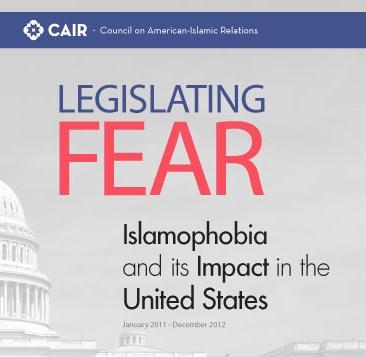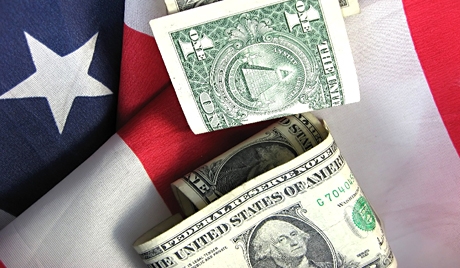The US largest Muslim civil rights and advocacy organization today released a report, "Legislating Fear: Islamophobia and its Impact in the United States," which reveals that anti-Islam groups received more than $119 million in funding between 2008 and 2011.
The new report by the Washington-based Council on American-Islamic Relations (CAIR) also identifies 37 organizations dedicated to promoting anti-Islam prejudice in America. CAIR's second report on the subject more fully identifies the "Islamophobia network" in the United States and exposes its funding.
"This report sheds light on the groups promoting Islamophobia in our society and reveals to the reader the impact those groups have on our nation's discourse about Islam, pluralism and the future of the protections enshrined in the U.S. Constitution," said Corey Saylor, who directs CAIR's department to monitor and combat Islamophobia.
You can obtain the full report here.
CAIR's findings include:
* The U.S.-based Islamophobia network's "inner core" is currently comprised of at least 37 groups whose primary purpose is to promote prejudice against or hatred of Islam and Muslims. An additional 32 groups whose primary purpose does not appear to include promoting prejudice against or hatred of Islam and Muslims, but whose work regularly demonstrates or supports Islamophobic themes, make up the network's "outer core."
* The inner core of the U.S.-based Islamophobia network enjoyed access to at least $119,662,719 in total revenue between 2008 and 2011. Groups in the inner core are often tightly linked with each other. Key players in the network benefitted from large salaries as they encouraged the American public to fear Islam.
* In 2011 and 2012, 78 bills or amendments designed to marginalize Muslims and vilify Islamic religious practices were introduced in the legislatures of 29 states and the U.S. Congress. Sixty-two of these bills contained language that was extracted from David Yerushalmi's American Laws for American Courts (ALAC) model legislation. While the bias motive behind the bills is clear, the presence of an actual problem that needed to be solved was not -- even to the legislators introducing the measures. In at least 11 states, mainstream Republican leaders introduced or supported anti-Muslim legislation.
* Subject matter experts perceive a small but welcome decline in Islamophobia in America during the period covered by this report. In 2012, CAIR rates Islamophobia as a 5.9 on a scale of one to 10, with one representing an America free of Islamophobia and 10 being the worst possible situation for Muslims. In 2010, CAIR rated the state of Islamophobia in America as a 6.4.
The decline makes particular sense given that the 2010 rating interviews were conducted in September and October of 2010. This period was the height of the national controversy over Park 51, aka "the Ground Zero Mosque." The controversy's proximity to the 2010 mid-term election made it a campaign issue. It was also right at the time of the planned burning of Qurans by Florida Pastor Terry Jones. This period in 2010 can be seen as the Islamophobia network's greatest penetration into mainstream discourse to date.
* There were 51 recorded anti-mosque acts during the period covered by this report, 29 in 2012 and 22 in 2011. Two notable spikes in anti-mosque acts occurred in 2011-2012: May 2011 (7 acts), likely related to the killing of Osama bin Laden, and August 2012 (10 acts), probably all in reaction to the massacre of six Sikh worshippers by a white supremacist in Oak Creek, Wis. By comparison, in June 2010, CAIR published "CAIR: Who we are," a review of 1,999 CAIR press releases and action alerts spanning 1994-2008. In that report we noted: "Since 1994, CAIR has detailed at least 64 acts of destruction and defilement of Islamic places of worship--including shootings, vandalism, arson, and bombings."
CAIR's report also notes that anti-Muslim trainers serving law enforcement and military personnel were dealt a significant blow in late 2011 and that Islamophobic rhetoric remains socially acceptable.
In 2011, after significant pressure from CAIR and other organizations that included crucial reporting by Wired.com's Spencer Ackerman, federal authorities initiated steps to remove biased and inaccurate material about Islam from law enforcement training materials. Studies and a lack of consequences for most candidates for public office who engage in anti-Muslim rhetoric reveal an unfortunate societal tolerance for prejudicial speech directed at Muslim.
CAIR names individuals, institutions and groups that were at the center of promoting Islamophobia in America during the period covered by the report.
Source: prnewswire.com




